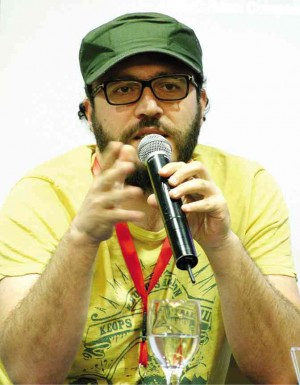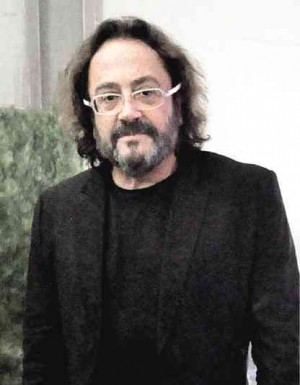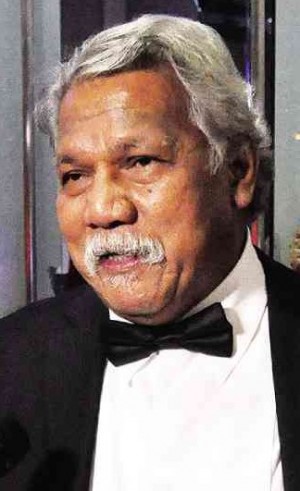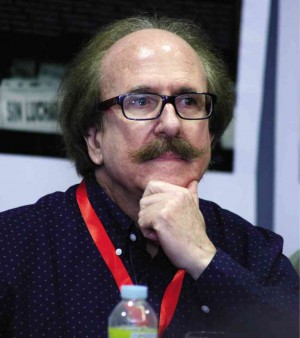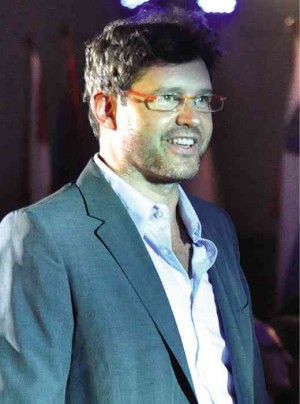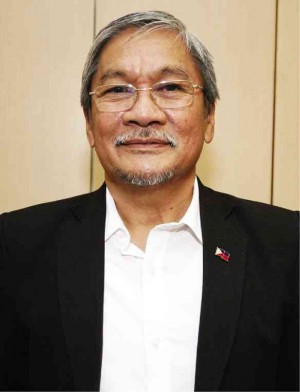Now showing: 40 films from 27 countries

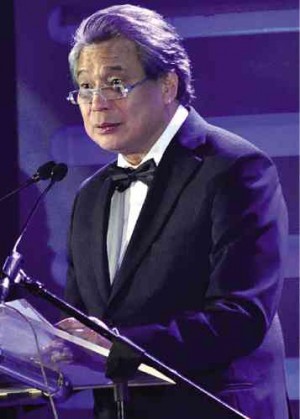
FILM Development Council of the Philippines chair Briccio Santos welcomes guests on Sunday. photo by RICHARD REYES
Spanish filmmaker Juan Pinzas is not troubled that his film, “New York Shadows,” is competing with the works of two other directors from Spain for the top honors to be handed out Wednesday night at the awards ceremony for the 2014 World Premieres Film Festival (WPFF).
Pinzas is up against compatriots Arturo Prins (“Autopsy of Love”) and Vicente Perez Herrero (“Crustaceos”) for the Best Picture trophy. Also in the race are entries from Brazil, Iran, Turkey, Ecuador and the Philippines. The awards show will be held at the Centerstage theater of SM Mall of Asia in Pasay City.
“We’re all friends,” Pinzas said in Spanish during a press conference organized by the Film Development Council of the Philippines (FDCP) on Sunday. “We’re presenting three different kinds of movies. To determine which is the best is actually the problem of the jury members. I’m not worried at all. I take pleasure in participating in this pioneering festival.”
Pinzas said he created “New York Shadows” while battling depression after a minor surgical procedure. “The project was a form of self-therapy. Its ending is not fixed; it’s very free. It tries to involve the viewers, encourages them to think.”
He described the film as a “philosophical dissertation of the process of creating a work of art, which considers the underlying psychological issues accompanying one’s devotion to his craft.”
‘Mono con Gallinas’
Ecuadorian filmmaker Alfredo Leon Leon hopes the inclusion of his “Mono con Gallinas” at the WPFF would pave the way for more Latin American films to reach Asia.
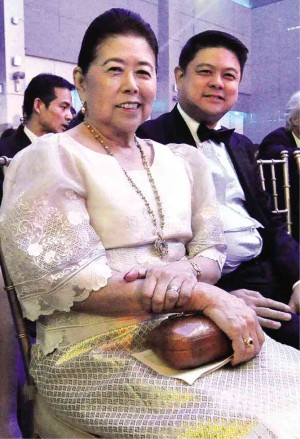
INQUIRER Group chair Marixi Prieto and Paolo Prieto, Inquirer Interactive Inc. president. PDI is an FDCP media partner for the festival. RICHARD REYES
The film industry in Ecuador is quite young, Leon reported. “A lot has changed since five to seven years ago. There was no film law until 2006 and public funds were made available only in 2010. Before 2006, the country produced one film every five years. Now, we make 10 films a year.”
Said the first-time filmmaker: “I’m happy to represent Ecuador in this film fest. Philippine and Ecuadorian cultures are very similar, even though the countries are [geographically] far apart. It took me two days to get to Manila. Now that I’m here, I see that our countries look alike. Even the people look alike!”
“Mono Con Gallinas” is a true-life drama based on the territorial conflict between Ecuador and Peru in the 1940s. It was shot in the jungles of Ecuador. “It focuses on one Ecuadorian soldier, who is actually my grandfather’s brother,” Leon told reporters. “It was difficult to write the film, to find the point where reality and fiction blend seamlessly. I’m curious to know how the Filipino audience will react to it.”
‘The Sharks of Copacabana’
Rosario Boyer, director of “The Sharks of Copacabana” (Brazil), is the only female director competing in the International World Premiere category. The other festival sections are Cine Verde, Out of Competition, Asean Skies, Euroview and Ibero-America.
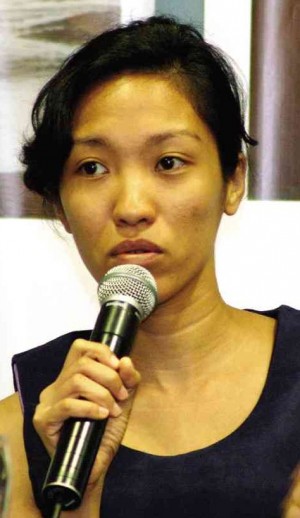
KRISTINE Kintana represented Lav Diaz, director of PH entry “From What Is Before,” at the press con. KIMBERLY DE LA CRUZ
The 101-minute drama tells of the friendship and disagreements among a group of surfers reunited after 50 years.
Working with a male-dominated cast posed no problems for Boyer. “I am very familiar with the culture of surfers. A former boyfriend was a surfer. Until now, though, I can’t swim,” she said in Spanish. “Also, the production team has more female members than males so there was some sort of balance.”
‘Autopsy of Love’
Arturo Prins worked on the documentary “Autopsy of Love” initially in an attempt to reconcile with an ex-girlfriend. “At first it contained my letter to her,” he said of the project, which took 10 years to finish. The documentary, he said, “examines the reasons behind the collapse of romantic relationships, and dismantles traditional archetypes of love.”
Said Prins, who eventually moved on and met other girls, “I have a new diagram of what love is. I’m free of all stereotypical thoughts on romanticism, like the notion that love is meant for only one woman.”
‘Crustaceos’
“Crustaceos” is not a movie about crustaceans, declared its Spanish director, Vicente Perez Herrero. It is a docu-drama on contemporary Spanish history. For two years, he captured street demonstrations against crisis and social welfare cuts in Spain.
“I’m saying that, just like crustaceans, people hide their wounds under hard shells,” Herrero explained. The director noted that most of the violent scenes in the movie were edited “because they were not significant in the story.” Censorship in Spain has always been liberal, he added. “There is a lot of freedom in relation to arts, religion and sexuality. Everybody just respects one another’s beliefs.”
‘Our Hodja’
Turkish director F. Serkan Acar said he created the comedy film “Our Hodja” with Yilmaz Okumus for two reasons. “First, because we wanted to tackle the issue that hydroelectric power plants (HPP) in the country destroy the environment. We figured that a comedy film would be more effective than drama or a documentary in putting our message across. Yilmaz is a good comedy writer.”
The other reason was, they sought to present “religion from a different standpoint.” Acar explained: “We wanted to show how much the Muslims’ way of life in Turkey has changed through the years. Hodja is not your typical imam (Muslim religious leader). He wants to change the bad habits of the people in his village. He leads the protest against the construction of an HPP next to a river that flows through the village.”
Acar reported that “Our Hodja” was well-received in Turkey when it was shown in 2013. “It’s a very personal film, and we shot it in our own village. We didn’t plan to show it internationally. That it was included in the festival lineup is a bonus for me.”
‘Romantic Nostalgia’
Iranian filmmaker Reza Azamian, whose work is “Romantic Nostalgia,” missed his flight to Manila, according to FDCP executive director Ted Granados. Azamian’s 88-minute feature is set in a time of war and tells of a couple who marries despite the disapproval of their families. Upon their return from the honeymoon, they encounter a situation that permanently alters their lives.
‘From What is Before’
Philippine representative Lav Diaz failed to attend the media gathering because he was busy with last-minute editing work for his entry, “From What Is Before.” The film, which runs for five hours, is set in 1972, at the verge of martial law. It tries to examine what Diaz considers the country’s “darkest period.”
The WPFF is part of the FDCP-initiated International Film Expo, which opened on June 27. Some 40 films from 27 countries are being screened in SM Cinemas in Metro Manila from Wednesday until July 8.
(E-mail mcruz@inquirer.com.ph)
